Discover Space Nuts: Astronomy Insights & Cosmic Discoveries
Space Nuts: Astronomy Insights & Cosmic Discoveries

Space Nuts: Astronomy Insights & Cosmic Discoveries
Author: Professor Fred Watson and Andrew Dunkley
Subscribed: 5,490Played: 249,736Subscribe
Share
© Copyright bitesz.com
Description
Join Professor Fred Watson and Sci-Fi Author Andrew Dunkley on Space Nuts as they delve into astronomy, space travel, and cosmic mysteries. Explore groundbreaking discoveries and listener Q&A in captivating discussions. Follow us on social media to engage with our community!
Two episodes a week with news and explainer focused editions published on Thursday's and our Listener Q&A focused edition on Monday's.
Become a supporter of this podcast: https://www.spreaker.com/podcast/space-nuts-astronomy-insights-cosmic-discoveries--2631155/support.
Two episodes a week with news and explainer focused editions published on Thursday's and our Listener Q&A focused edition on Monday's.
Become a supporter of this podcast: https://www.spreaker.com/podcast/space-nuts-astronomy-insights-cosmic-discoveries--2631155/support.
594 Episodes
Reverse
This episode of Space Nuts is brought to you with the support of Antigravity A1. Experience the future of flight with the world’s first all-in-one 8K 360 drone. With intuitive controls and immersive goggles, the Antigravity A1 redefines what it means to fly. Check it out at AntigravityA1.Archived Insights: Europa Clipper, Gravitational Waves, and Black Hole MysteriesIn this special episode of Space Nuts, hosts Andrew Dunkley and Professor Fred Watson take a fascinating journey through some of the most compelling questions and discoveries in astronomy. As they explore the Europa Clipper mission, the nature of gravitational waves, and the enigmatic world of black holes, listeners are treated to a rich tapestry of cosmic knowledge. This episode originally aired in 2019.Episode Highlights:- Europa Clipper Mission: Andrew and Fred discuss NASA's exciting approval for the Europa Clipper mission, aimed at exploring Jupiter's icy moon Europa. They delve into the spacecraft's objectives, including investigating the moon's potential subsurface ocean and the challenges posed by Jupiter's intense radiation.- Gravitational Waves Explained: The hosts explore the recent detection of gravitational waves, speculating on their origins, including a possible black hole-neutron star merger. They discuss the significance of these findings and the ongoing efforts of astronomers to understand the universe's most violent events.- Black Hole Chris: Listener questions about the nature of black holes spark a lively discussion on topics such as infinite density, event horizons, and the complexities of capturing images of these cosmic phenomena. Andrew and Fred clarify misconceptions and provide insightful explanations.- Space Travel and Relativity: The episode wraps up with an intriguing listener question about the effects of traveling near the speed of light. Andrew and Fred clarify how relativistic mass works and dispel myths surrounding the transformation of spaceships into black holes.For more Space Nuts, including our continuously updating newsfeed and to listen to all our episodes, visit our website. Follow us on social media at SpaceNutsPod on Facebook, X, YouTube Music Music, Tumblr, Instagram, and TikTok. We love engaging with our community, so be sure to drop us a message or comment on your favorite platform.If you’d like to help support Space Nuts and join our growing family of insiders for commercial-free episodes and more, visit spacenutspodcast.com/about.Stay curious, keep looking up, and join us next time for more stellar insights and cosmic wonders. Until then, clear skies and happy stargazing.Become a supporter of this podcast: https://www.spreaker.com/podcast/space-nuts-astronomy-insights-cosmic-discoveries--2631155/support.
Cosmic Q&A: Light in Space, Astronaut Shielding, and Ice GiantsIn this engaging Q&A edition of Space Nuts, hosts Andrew Dunkley and Professor Fred Watson tackle intriguing listener questions that delve into the mysteries of space. From the visibility of Voyager 1 in the depths of the solar system to the challenges of shielding astronauts from cosmic radiation, this episode is a treasure trove of cosmic knowledge.Episode Highlights:- Light in Space: Lee from New York City poses a thought-provoking question about how much light exists in space. Andrew and Fred explore the visibility of Voyager 1 and the implications of being far from the Sun, shedding light on human eye sensitivity and the ambient light from stars.- Shielding Astronauts: Fenton from St. Paul, Minnesota, raises an important question about protecting astronauts from radiation beyond the Van Allen Belt. The hosts discuss potential technologies, including superconducting electromagnets and the surprising effectiveness of hydrogen-rich materials like water as radiation shields.- Moon Comparisons: Robert from Vienna, Austria, wonders how our understanding of the solar system would differ if Earth had a moon like Europa or Titan, rather than our heavily cratered moon. The discussion highlights the significance of craters in understanding planetary history and the feasibility of landing on such moons.- Ice Giants Explained: Duncan from Weymouth, UK, questions why Uranus and Neptune are termed "ice giants" instead of "rock giants." Andrew and Fred clarify the definitions and characteristics that distinguish these planets from their gas giant counterparts, emphasizing the unique atmospheric compositions.For more Space Nuts, including our continuously updating newsfeed and to listen to all our episodes, visit our website. Follow us on social media at SpaceNutsPod on Facebook, X, YouTube Music Music, Tumblr, Instagram, and TikTok. We love engaging with our community, so be sure to drop us a message or comment on your favorite platform.If you’d like to help support Space Nuts and join our growing family of insiders for commercial-free episodes and more, visit spacenutspodcast.com/about.Stay curious, keep looking up, and join us next time for more stellar insights and cosmic wonders. Until then, clear skies and happy stargazing.Become a supporter of this podcast: https://www.spreaker.com/podcast/space-nuts-astronomy-insights-cosmic-discoveries--2631155/support.
Cosmic Discoveries: Frame Dragging, Mars Rover Naming, and Intern TriumphsIn this holiday replay episode from the Space Nuts archives, hosts Andrew Dunkley and Professor Fred Watson explore groundbreaking astronomical phenomena and inspiring stories from the cosmos. From the intriguing discovery of frame dragging in space-time to the triumphs of young minds in the field of astronomy, this episode is packed with fascinating insights.Episode Highlights:- Frame Dragging Phenomenon: Andrew and Fred delve into the recent detection of frame dragging around a white dwarf pulsar binary system, discussing its implications for general relativity and our understanding of gravity in the universe.- Naming the Next Mars Rover: The hosts share the story behind the naming of the Mars 2020 rover, "Perseverance," chosen by a young student, highlighting the importance of perseverance in scientific exploration.- Young Intern's Discovery: A remarkable tale of a 17-year-old intern at NASA, who discovered a new planet just three days into his internship, showcasing the potential of the next generation in astronomy.- Listener Questions: The episode wraps up with insightful listener questions about black holes and the mysterious nature of singularities, prompting deep discussions on the complexities of the universe.For more Space Nuts, including our continuously updating newsfeed and to listen to all our episodes, visit our website. Follow us on social media at SpaceNutsPod on Facebook, X, YouTube Music Music, Tumblr, Instagram, and TikTok. We love engaging with our community, so be sure to drop us a message or comment on your favorite platform.If you’d like to help support Space Nuts and join our growing family of insiders for commercial-free episodes and more, visit spacenutspodcast.com/about.Stay curious, keep looking up, and join us next time for more stellar insights and cosmic wonders. Until then, clear skies and happy stargazing.Become a supporter of this podcast: https://www.spreaker.com/podcast/space-nuts-astronomy-insights-cosmic-discoveries--2631155/support.
This episode of Space Nuts is brought to you with the support of Antigravity A1. Experience the future of flight with the world’s first all-in-one 8K 360 drone. With intuitive controls and immersive goggles, the Antigravity A1 redefines what it means to fly. Check it out at AntigravityA1.Archived Insights: Gravitational Waves, Earth's Fate, and Dark EnergyIn this special episode of Space Nuts, hosts Andrew Dunkley and Professor Fred Watson take a trip down memory lane, revisiting some of the most compelling questions from their Q&A sessions. This episode features discussions on gravitational waves produced by the Big Bang, a thought-provoking "what if" scenario regarding the Earth's fate if the Sun never dies, and a deep dive into the enigmatic nature of dark energy.Episode Highlights:- Gravitational Waves and the Big Bang: Andrew and Fred tackle a listener's inquiry about whether the Big Bang generated gravitational waves and how these might be detected alongside the cosmic microwave background radiation.- The Fate of Earth: A "what if" question explores the implications of an immortal Sun and how Earth's environment might evolve, leading to fascinating speculations about tidal locking and atmospheric changes.- Time and Dark Energy: The hosts discuss a listener's theory proposing a connection between time and dark energy, addressing the complexities of cosmic expansion and the role of gravity in shaping our understanding of the universe.For more Space Nuts, including our continuously updating newsfeed and to listen to all our episodes, visit our website. Follow us on social media at SpaceNutsPod on Facebook, X, YouTube Music Music, Tumblr, Instagram, and TikTok. We love engaging with our community, so be sure to drop us a message or comment on your favorite platform.If you’d like to help support Space Nuts and join our growing family of insiders for commercial-free episodes and more, visit spacenutspodcast.com/about.Stay curious, keep looking up, and join us next time for more stellar insights and cosmic wonders. Until then, clear skies and happy stargazing.Become a supporter of this podcast: https://www.spreaker.com/podcast/space-nuts-astronomy-insights-cosmic-discoveries--2631155/support.
This episode of Space Nuts is brought to you with the support of Antigravity A1. Experience the future of flight with the world’s first all-in-one 8K 360 drone. With intuitive controls and immersive goggles, the Antigravity A1 redefines what it means to fly. Check it out at AntigravityA1.Frozen Frontiers: Snowball Earth, Dinosaur Origins, and Hubble TensionIn this captivating holiday episode of Space Nuts, hosts Andrew Dunkley and Professor Fred Watson embark on a journey through time and space, discussing the intriguing concept of Snowball Earth, the origins of the dinosaur-killing asteroid, and the ongoing debate surrounding the Hubble tension in cosmology.Episode Highlights:- Snowball Earth: Andrew and Fred explore the fascinating theory of Snowball Earth, a period when our planet was completely frozen over, and how recent geological findings in Scotland and Australia shed light on this icy epoch.- Dinosaur-Killing Asteroid Origins: The hosts delve into the latest research pinpointing the Chicxulub impactor's origins within the asteroid belt, revealing the chemical markers that help trace its journey through the solar system.- The Hubble Tension: A discussion on the so-called crisis in cosmology, as the hosts dissect the differing measurements of the universe's expansion rate and how new data from the James Webb Space Telescope may provide clarity.- Listener Questions: The episode wraps up with engaging listener questions, including a fascinating inquiry about the impact of a frozen Earth on its diameter, prompting a thoughtful discussion on planetary changes over time.For more Space Nuts, including our continuously updating newsfeed and to listen to all our episodes, visit our website. Follow us on social media at SpaceNutsPod on Facebook, X, YouTube Music Music, Tumblr, Instagram, and TikTok. We love engaging with our community, so be sure to drop us a message or comment on your favorite platform.If you’d like to help support Space Nuts and join our growing family of insiders for commercial-free episodes and more, visit spacenutspodcast.com/about.Stay curious, keep looking up, and join us next time for more stellar insights and cosmic wonders. Until then, clear skies and happy stargazing.Become a supporter of this podcast: https://www.spreaker.com/podcast/space-nuts-astronomy-insights-cosmic-discoveries--2631155/support.
Sponsor Details:This episode of Space Nuts is brought to you with the support of Antigravity A1. Experience the future of flight with the world’s first all-in-one 8K 360 drone. With intuitive controls and immersive goggles, the Antigravity A1 redefines what it means to fly. Check it out at AntigravityA1.And NordVPN. Protect your online data with NordVPN. Get our special listener discounts and four months free with a 30-day money-back guarantee at www.nordvpn.com/spacenuts using the coupon code SPACENUTS at checkout.Cosmic Queries: Time Dilation, Black Holes, and GravastarsIn this thought-provoking Q&A edition of Space Nuts, hosts Andrew Dunkley and Professor Fred Watson tackle a range of intriguing questions from listeners around the globe. From the complexities of time dilation near supergiant stars to the mysteries surrounding black holes and the hypothetical concept of gravastars, this episode is a deep dive into the fabric of our universe.Episode Highlights:- Time Dilation Near Supergiants: Andrew and Fred discuss the effects of gravity on time near supergiant stars and whether significant time dilation occurs compared to black holes.- Black Holes and Stars: A listener inquires why black holes can’t revert to stars, prompting a fascinating exploration of singularity and the structure of stars.- Understanding Atoms and Black Holes: The hosts clarify the nature of atoms, free space, and how density calculations relate to black holes, addressing the paradox of infinite density.- Redshift Limits and Gravastars: The episode wraps up with an examination of redshift limits in the expanding universe and a discussion about the theoretical existence of gravastars, including their implications for our understanding of cosmic phenomena.For more Space Nuts, including our continuously updating newsfeed and to listen to all our episodes, visit our website. Follow us on social media at SpaceNutsPod on Facebook, X, YouTube Music Music, Tumblr, Instagram, and TikTok. We love engaging with our community, so be sure to drop us a message or comment on your favorite platform.If you’d like to help support Space Nuts and join our growing family of insiders for commercial-free episodes and more, visit spacenutspodcast.com/about.Stay curious, keep looking up, and join us next time for more stellar insights and cosmic wonders. Until then, clear skies and happy stargazing.Become a supporter of this podcast: https://www.spreaker.com/podcast/space-nuts-astronomy-insights-cosmic-discoveries--2631155/support.
Sponsor Details:This episode of Space Nuts is brought to you with the support of Antigravity A1. The Antigravity A1 is the world’s first 8K 360 drone, it’s genuinely a game-changer. You get full immersive flight with the goggles, insanely intuitive controls, and endless creative freedom in editing.If you’re thinking about buying a drone, make it this one. Check out the link to learn more: AntigravityA1And NordVPN. To get our special Space Nuts listener discounts and four months free bonus, all with a 30-day money-back guarantee, simply visit www.nordvpn.com/spacenuts or use the coupon code SPACENUTS at checkout.Cosmic Conversations: Time on Mars, Eccentric Orbits, and Space GumIn this riveting episode of Space Nuts, hosts Andrew Dunkley and Professor Fred Watson embark on a fascinating journey through the cosmos, tackling the complexities of timekeeping on Mars, the peculiar orbit of exoplanet TOI 3884B, and a surprising discovery from asteroid Bennu.Episode Highlights:- Timekeeping on Mars: Andrew and Fred delve into the challenges of synchronizing time between Earth and Mars, highlighting the unique aspects of Martian days and the effects of relativity that complicate clock synchronization.- TOI 3884B's Eccentric Orbit: The hosts explore the unusual orbit of TOI 3884B, a planet that orbits its star at a significant angle, raising questions about its formation and the dynamics at play in its solar system.- Space Gum from Asteroid Bennu: A surprising find of nitrogen-rich polymeric sheets in the samples returned from asteroid Bennu leads to a discussion about the origins of this "space gum" and its implications for understanding asteroid composition and formation.- Curiosities and Speculations: The episode wraps up with playful banter about the implications of these discoveries and the mysteries that continue to unfold in our universe.For more Space Nuts, including our continuously updating newsfeed and to listen to all our episodes, visit our website. Follow us on social media at SpaceNutsPod on Facebook, X, YouTube Music Music, Tumblr, Instagram, and TikTok. We love engaging with our community, so be sure to drop us a message or comment on your favorite platform.If you’d like to help support Space Nuts and join our growing family of insiders for commercial-free episodes and more, visit spacenutspodcast.com/about.Stay curious, keep looking up, and join us next time for more stellar insights and cosmic wonders. Until then, clear skies and happy stargazing.Become a supporter of this podcast: https://www.spreaker.com/podcast/space-nuts-astronomy-insights-cosmic-discoveries--2631155/support.
Sponsor Details:This episode of Space Nuts is brought to you with the support of NordVPN. To get our special Space Nuts listener discounts and four months free bonus, all with a 30-day money-back guarantee, simply visit www.nordvpn.com/spacenuts or use the coupon code SPACENUTS at checkout.Cosmic Curiosities: Time Dilation, Supernova Remnants, and Aurora ColorsIn this engaging Q&A edition of Space Nuts, hosts Andrew Dunkley and Professor Fred Watson tackle a series of thought-provoking questions from their curious audience. From the enigmatic nature of time in anti-gravity fields to the vibrant colors of auroras, this episode dives deep into the mysteries of the cosmos.Episode Highlights:- Time in Anti-Gravity Fields: Andrew and Fred explore the implications of time dilation in gravitational and anti-gravity environments, discussing how time appears to flow differently depending on the observer's frame of reference.- Supernova Remnants: The hosts address whether we can still see the star remnants that contributed to the formation of heavy elements in our solar system, revealing the complexities of cosmic recycling.- The Colors of Aurora: Listener Nate's question about the stunning colors of auroras leads to a fascinating discussion on the atmospheric processes that create different hues, from greens to reds and beyond.- Relativistic Mass and Spacecraft Acceleration: Lee from Sweden poses an intriguing idea about using relativistic mass ejection to enhance spacecraft propulsion, prompting a conversation about the theoretical limits of current technology and the physics involved.For more Space Nuts, including our continuously updating newsfeed and to listen to all our episodes, visit our website. Follow us on social media at SpaceNutsPod on Facebook, X, YouTube Music Music, Tumblr, Instagram, and TikTok. We love engaging with our community, so be sure to drop us a message or comment on your favorite platform.If you’d like to help support Space Nuts and join our growing family of insiders for commercial-free episodes and more, visit spacenutspodcast.com/about.Stay curious, keep looking up, and join us next time for more stellar insights and cosmic wonders. Until then, clear skies and happy stargazing.Become a supporter of this podcast: https://www.spreaker.com/podcast/space-nuts-astronomy-insights-cosmic-discoveries--2631155/support.
Sponsor Details:This episode of Space Nuts is brought to you with the support of NordVPN. To get our special Space Nuts listener discounts and four months free bonus, all with a 30-day money-back guarantee, simply visit www.nordvpn.com/spacenuts or use the coupon code SPACENUTS at checkout.Cosmic Discoveries: Erupting Comets, Boiling Ice Moons, and Mars' Climate SecretsIn this captivating episode of Space Nuts, hosts Andrew Dunkley and Professor Fred Watson delve into the latest astronomical revelations that are reshaping our understanding of the cosmos. From the surprising eruptions of the exo-comet 3I Atlas to the intriguing boiling oceans beneath the icy crusts of moons like Enceladus, this episode is filled with cosmic wonders.Episode Highlights:- Eruptions on Comet 3I Atlas: Andrew and Fred explore the recent findings about the interstellar comet 3I Atlas, which appears to be experiencing volcanic eruptions. They discuss the concept of cryovolcanoes and how the comet's interactions with solar radiation may be causing these fascinating phenomena.- Boiling Oceans of Ice Moons: The hosts examine new research from the University of California, Davis, which suggests that the ice moons of our solar system, including Enceladus, may have boiling oceans beneath their icy crusts. They explain how tidal forces and pressure changes could lead to this unexpected behavior.- New Evidence of Mars' Climate: Andrew and Fred discuss exciting discoveries made by NASA's Perseverance rover, which has found evidence of a wet, tropical climate on Mars billions of years ago. They delve into the implications of these findings and what they might mean for the potential of past life on the Red Planet.- Launch Pad Mishap: The episode concludes with a discussion about the recent incident involving the Soyuz launch pad, where a service platform was damaged following a successful launch. The hosts reflect on the challenges faced in human spaceflight and the ongoing cooperation between international space agencies despite geopolitical tensions.For more Space Nuts, including our continuously updating newsfeed and to listen to all our episodes, visit our website. Follow us on social media at SpaceNutsPod on Facebook, X, YouTube Music Music, Tumblr, Instagram, and TikTok. We love engaging with our community, so be sure to drop us a message or comment on your favorite platform.If you’d like to help support Space Nuts and join our growing family of insiders for commercial-free episodes and more, visit spacenutspodcast.com/about.Stay curious, keep looking up, and join us next time for more stellar insights and cosmic wonders. Until then, clear skies and happy stargazing.Become a supporter of this podcast: https://www.spreaker.com/podcast/space-nuts-astronomy-insights-cosmic-discoveries--2631155/support.
Sponsor Details:This episode of Space Nuts is brought to you with the support of NordVPN. To get our special Space Nuts listener discounts and four months free bonus, all with a 30-day money-back guarantee, simply visit www.nordvpn.com/spacenuts or use the coupon code SPACENUTS at checkout.Cosmic Queries: The Birth of Our Sun, Future Discoveries, and Gas GiantsIn this thought-provoking Q&A episode of Space Nuts, hosts Andrew Dunkley and Professor Fred Watson tackle an array of intriguing listener questions that span the cosmos. From the possibility of witnessing the birth of our sun to the future of astronomical discoveries, this episode is filled with insights that will leave you pondering the mysteries of the universe.Episode Highlights:- The Birth of Our Sun: Daryl from South Australia wonders if we could ever witness the birth of our sun through ancient light. Andrew and Fred explore the limitations of observing such distant events and the fascinating concept of light echoes that allow us to glimpse historical cosmic phenomena.- Future Discoveries in Astronomy: Rennie from California asks what we might uncover in the next century regarding dark matter, dark energy, and the Big Bang. The hosts discuss the rapid advancements in technology and how they may lead to groundbreaking discoveries in our understanding of the universe.- Gas Giants and Their Moons: Dave from New Jersey poses a hypothetical scenario about a super Jupiter with an Earth-sized moon. The discussion delves into tidal locking and the potential for life in the Goldilocks zone of such massive planets, revealing the complexities of planetary formation.- Gas Giants and Supernovae: Cal from Swansea questions whether a gas giant could absorb debris from a supernova to become a star. The hosts clarify the dynamics of supernova explosions and the potential for rogue planets to host their own moons, igniting curiosity about the possibilities of life in the cosmos.For more Space Nuts, including our continuously updating newsfeed and to listen to all our episodes, visit our website. Follow us on social media at SpaceNutsPod on Facebook, X, YouTube Music Music, Tumblr, Instagram, and TikTok. We love engaging with our community, so be sure to drop us a message or comment on your favorite platform.If you’d like to help support Space Nuts and join our growing family of insiders for commercial-free episodes and more, visit spacenutspodcast.com/about.Stay curious, keep looking up, and join us next time for more stellar insights and cosmic wonders. Until then, clear skies and happy stargazing.Become a supporter of this podcast: https://www.spreaker.com/podcast/space-nuts-astronomy-insights-cosmic-discoveries--2631155/support.
Sponsor Details:This episode of Space Nuts is brought to you with the support of NordVPN. To get our special Space Nuts listener discounts and four months free bonus, all with a 30-day money-back guarantee, simply visit www.nordvpn.com/spacenuts or use the coupon code SPACENUTS at checkout.Exploring Theia, Near-Earth Asteroids, and EnceladusIn this exciting episode of Space Nuts, hosts Andrew Dunkley and Professor Fred Watson dive into a wealth of astronomical discoveries and insights. From new revelations about the ancient collision between Earth and Theia to the astounding discovery of 40,000 near-Earth asteroids, this episode is packed with cosmic revelations that will spark your curiosity about the universe.Episode Highlights:- Theia and Earth's Relationship: Andrew and Fred discuss groundbreaking research from the Max Planck Institute that redefines our understanding of Theia, the protoplanet that collided with Earth. They explore how isotopic similarities suggest Theia was not just a random object, but likely a companion planet in the early solar system.- 40,000 Near-Earth Asteroids: The hosts celebrate the milestone of 40,000 discovered near-Earth asteroids, discussing the implications for planetary defense and the importance of monitoring potentially hazardous objects that could pose a threat to Earth.- Life on Enceladus: A thrilling discussion emerges around the latest findings from the Cassini mission, revealing new organic compounds in the icy plumes of Enceladus. Andrew and Fred ponder the exciting possibility of life existing in the subsurface ocean of this intriguing moon of Saturn.- Updates on Comet 3I Atlas: The episode wraps up with an update on the interstellar comet 3I Atlas, including stunning new images captured from Mars. The hosts discuss the significance of these observations and what they might reveal about the comet's characteristics as it continues its journey through our solar system.For more Space Nuts, including our continuously updating newsfeed and to listen to all our episodes, visit our website. Follow us on social media at SpaceNutsPod on Facebook, X, YouTube Music Music, Tumblr, Instagram, and TikTok. We love engaging with our community, so be sure to drop us a message or comment on your favorite platform.If you’d like to help support Space Nuts and join our growing family of insiders for commercial-free episodes and more, visit spacenutspodcast.com/about.Stay curious, keep looking up, and join us next time for more stellar insights and cosmic wonders. Until then, clear skies and happy stargazing.Become a supporter of this podcast: https://www.spreaker.com/podcast/space-nuts-astronomy-insights-cosmic-discoveries--2631155/support.
Sponsor Details:This episode of Space Nuts is brought to you with the support of NordVPN. To get our special Space Nuts listener discounts and four months free bonus, all with a 30 day money back guarantee, simply visit wwwnordvpn.com/spacenuts or use the coupon code SPACENUTS at checkout.Cosmic Queries: The Big Crunch, Gravitational Waves, and Planetary CoresIn this engaging Q&A episode of Space Nuts, hosts Andrew Dunkley and Professor Jonti Horner explore a variety of thought-provoking questions from listeners. Delving into the mysteries of the universe, they tackle topics such as the Big Crunch, the nature of gravitational waves, the implications of shifting magnetic poles, and the intriguing composition of gas and ice giants.Episode Highlights:- The Big Crunch and Light: Andrew and Jonti discuss the concept of the Big Crunch, examining how light and energy would behave as the universe contracts. They explore the potential for a reverse Big Bang scenario and the scientific implications of such a cataclysmic event.- Gravitational Waves Interference: Listener Bob poses a fascinating question about what happens when gravitational waves intersect. The hosts explain the interference patterns that could arise and the complexities involved in understanding these phenomena, especially in the context of current gravitational wave detection technology.- Shifting Magnetic Poles: Paddy's query about the behavior of Earth's magnetic field during a pole flip leads to a discussion on the historical occurrences of geomagnetic reversals and their effects on the planet. Andrew and Jonti clarify misconceptions and provide insights into the potential impacts on technology and life on Earth.- Richie Cores of Gas and Ice Giants: Martin's inquiry into the composition of gas and ice giants prompts a deep dive into planetary formation theories. The hosts discuss how scientists determine whether these planets have rocky cores and what alternative structures might exist within them, shedding light on the complexity of our solar system.For more Space Nuts, including our continuously updating newsfeed and to listen to all our episodes, visit our website. Follow us on social media at SpaceNutsPod on Facebook, X, YouTube Music Music, Tumblr, Instagram, and TikTok. We love engaging with our community, so be sure to drop us a message or comment on your favorite platform.If you’d like to help support Space Nuts and join our growing family of insiders for commercial-free episodes and more, visit spacenutspodcast.com/about.Stay curious, keep looking up, and join us next time for more stellar insights and cosmic wonders. Until then, clear skies and happy stargazing.Become a supporter of this podcast: https://www.spreaker.com/podcast/space-nuts-astronomy-insights-cosmic-discoveries--2631155/support.
Sponsor Details:This episode of Space Nuts is brought to you with the support of NordVPN. To get our special Space Nuts listener discounts and four months free bonus, all with a 30 day money back guarantee, simply visit wwwnordvpn.com/spacenuts or use the coupon code SPACENUTS at checkout.Leonid Meteor Shower, Mars Escapade Mission, and GyrochronologyIn this captivating episode of Space Nuts, hosts Andrew Dunkley and Professor Jonti Horner delve into the latest astronomical events and missions. From the ongoing Leonid meteor shower to the successful launch of the Mars Escapade mission, this episode is filled with stellar insights and cosmic discoveries that will ignite your curiosity about the universe.Episode Highlights:- The Leonid Meteor Shower: Andrew and Jonti discuss the current Leonid meteor shower, exploring its unique characteristics and historical significance. They explain the science behind meteor showers and the factors that influence their visibility, providing listeners with tips on when and where to catch the best views.- Successful Mars Escapade Mission: The hosts share exciting news about the Mars Escapade mission, which has successfully launched aboard Blue Origin's New Glenn rocket. They discuss the mission's innovative trajectory, which involves a gravity assist from Earth, and the scientific objectives aimed at unraveling the mysteries of Mars' atmosphere and its evolution over time.- Chasing Stars with Gyrochronology: In a fascinating segment, Andrew and Jonti introduce the concept of gyrochronology, a method used to estimate the ages of stars based on their rotation rates. They explore how this technique can help identify stars that were once part of the Pleiades cluster, shedding light on the complex history of star formation in our galaxy.- Chinese Astronauts Stranded on Tiangong Space Station: The episode also covers the current situation involving Chinese astronauts stranded on the Tiangong Space Station due to a damaged spacecraft. Andrew and Jonti discuss the implications of this incident and the challenges faced by space missions in an increasingly crowded orbital environment.For more Space Nuts, including our continuously updating newsfeed and to listen to all our episodes, visit our website. Follow us on social media at SpaceNutsPod on Facebook, X, YouTube Music Music, Tumblr, Instagram, and TikTok. We love engaging with our community, so be sure to drop us a message or comment on your favorite platform.If you’d like to help support Space Nuts and join our growing family of insiders for commercial-free episodes and more, visit spacenutspodcast.com/about.Stay curious, keep looking up, and join us next time for more stellar insights and cosmic wonders. Until then, clear skies and happy stargazing.Become a supporter of this podcast: https://www.spreaker.com/podcast/space-nuts-astronomy-insights-cosmic-discoveries--2631155/support.
Sponsor Details:This episode of Space Nuts is brought to you with the support of NordVPN. To get our special Space Nuts listener discounts and four months free bonus, all with a 30 day money back guarantee, simply visit wwwnordvpn.com/spacenuts or use the coupon code SPACENUTS at checkout.Show NotesCosmic Queries: Expanding Universe, Space Elevators, and TOI 6894BIn this enlightening Q&A episode of Space Nuts, hosts Andrew Dunkley and Professor Jonti Horner tackle a variety of intriguing questions from listeners, diving deep into the mysteries of the universe. From the nuances of cosmic expansion to the potential of space elevators and the peculiarities of exoplanets, this episode is packed with cosmic curiosities and insightful discussions that will expand your understanding of the cosmos.Episode Highlights:- The Acceleration of Cosmic Expansion: Rusty from Western Australia asks about the terminology for the increasing acceleration of the universe's expansion. Andrew and Jonti discuss the complexities of this concept, the implications of dark energy, and the evolving nature of cosmological theories.- Space Elevators Explained: Barry's inquiry about the gravitational effects of a hypothetical space elevator prompts a detailed exploration of how gravity would be felt at various altitudes. The hosts discuss the feasibility of such a structure and the science behind gravity in different orbital scenarios.- Understanding TOI 6894B: Casey from Colorado wants to know why TOI 6894B is significant. Andrew and Jonti delve into the characteristics of this unusual exoplanet, its relationship with its low-mass star, and what its discovery means for our understanding of planet formation and the diversity of planetary systems.- Life in Gale Crater: A whimsical question from Philip McCrackpipe leads to a serious discussion about the potential for ancient life in Gale Crater on Mars. The hosts reflect on Mars' wet past and the types of life that may have thrived there, emphasizing the importance of ongoing exploration and research.For more Space Nuts, including our continuously updating newsfeed and to listen to all our episodes, visit our website. Follow us on social media at SpaceNutsPod on Facebook, X, YouTube Music Music, Tumblr, Instagram, and TikTok. We love engaging with our community, so be sure to drop us a message or comment on your favorite platform.If you’d like to help support Space Nuts and join our growing family of insiders for commercial-free episodes and more, visit spacenutspodcast.com/about.Stay curious, keep looking up, and join us next time for more stellar insights and cosmic wonders. Until then, clear skies and happy stargazing.Become a supporter of this podcast: https://www.spreaker.com/podcast/space-nuts-astronomy-insights-cosmic-discoveries--2631155/support.
3I Atlas, Human Remains on Mars, and Moon Formation InsightsIn this thought-provoking episode of Space Nuts, hosts Andrew Dunkley and Professor Jonti Horner dive into some controversial and intriguing topics in the realm of space exploration. From the latest on Comet 3I Atlas and the implications of the U.S. government shutdown to the divisive plan to send human remains to Mars, this episode is packed with cosmic curiosities and critical discussions that challenge our understanding of space and humanity's role within it.Episode Highlights:- The 3I Atlas Dilemma: Andrew and Jonti take a closer look at the ongoing situation surrounding Comet 3I Atlas, which recently passed Mars. They discuss why NASA has been silent on the data and the fallout from the U.S. government shutdown that has left many NASA employees unable to work or communicate about ongoing missions.- Human Remains on Mars: The hosts delve into the controversial proposal by the company Celestis to send human ashes to Mars. They discuss the cultural implications and sensitivities surrounding this idea, questioning the ethical considerations of sending human remains to another planet without broader consultation.- New Evidence of Moon Formation: A fascinating discovery in Western Australia sheds light on the formation of the Moon, with findings indicating that feldspar crystals found in ancient rocks on Earth closely match those on the lunar surface. This evidence supports the giant impact theory of the Moon's origin and offers insights into the early history of our planet.- The Future of the Universe: Andrew and Jonti explore the latest theories regarding the expansion of the universe, discussing new findings that suggest the universe may be slowing down rather than continuing to accelerate. They reflect on the implications of these discoveries and how they could reshape our understanding of cosmic evolution.For more Space Nuts, including our continuously updating newsfeed and to listen to all our episodes, visit our website. Follow us on social media at SpaceNutsPod on Facebook, X, YouTube Music Music, Tumblr, Instagram, and TikTok. We love engaging with our community, so be sure to drop us a message or comment on your favorite platform.If you’d like to help support Space Nuts and join our growing family of insiders for commercial-free episodes and more, visit spacenutspodcast.com/about.Stay curious, keep looking up, and join us next time for more stellar insights and cosmic wonders. Until then, clear skies and happy stargazing.Become a supporter of this podcast: https://www.spreaker.com/podcast/space-nuts-astronomy-insights-cosmic-discoveries--2631155/support.
Light Pollution, Space Parasols, and Salvaging SatellitesIn this engaging Q&A episode of Space Nuts, hosts Andrew Dunkley and Professor Jonti Horner tackle a range of thought-provoking questions from listeners. From the effects of light pollution on stargazing to the intriguing concept of a space parasol for climate control, this episode is packed with cosmic curiosities and insightful discussions that will leave you contemplating the future of humanity in space.Episode Highlights:- Light Pollution and Night Sky Visibility: Mark from Connecticut wonders how quickly the night sky would become visible if all electric lights suddenly went out. Andrew and Jonti discuss the immediate effects of light pollution and the importance of dark adaptation for optimal stargazing, emphasizing the impact of atmospheric conditions on visibility.- Geoengineering and Space Parasols: Doug raises the question of whether a parasol at Lagrange Point 1 could help mitigate climate change. The hosts explore the feasibility of such a project, discussing the challenges of scale, technology, and the implications of geoengineering on the Earth's climate system.- Salvage Rights in Space: A listener inquires about the ownership of defunct satellites and the potential for salvage rights in space. Andrew and Jonti explain the current legal landscape surrounding space debris, the challenges of recovery, and the evolving nature of space law as commercial interests grow.- Searching for Extraterrestrial Life: Robert from the Netherlands asks about the role of radio waves in searching for alien civilizations. The hosts delve into the efforts of the SETI program, the challenges of detecting signals, and the potential of the Square Kilometer Array to listen for extraterrestrial communications.For more Space Nuts, including our continuously updating newsfeed and to listen to all our episodes, visit our website. Follow us on social media at SpaceNutsPod on Facebook, X, YouTube Music Music, Tumblr, Instagram, and TikTok. We love engaging with our community, so be sure to drop us a message or comment on your favorite platform.If you’d like to help support Space Nuts and join our growing family of insiders for commercial-free episodes and more, visit spacenutspodcast.com/about.Stay curious, keep looking up, and join us next time for more stellar insights and cosmic wonders. Until then, clear skies and happy stargazing.Become a supporter of this podcast: https://www.spreaker.com/podcast/space-nuts-astronomy-insights-cosmic-discoveries--2631155/support.
Sponsor Details:This episode of Space Nuts is brought to you with the support of NordVPN...our official VPN partners. For a special Space Nuts deal which includes huge discounts and 4 extra months for free, visit www.nordvpn.com/spacenuts or use the code SPACENUTS at checkout. Stay safe online and away from prying eyes...use NordVPN!Meteorite Myths, Fireballs, and the Enigmatic 3I AtlasIn this thrilling episode of Space Nuts, hosts Andrew Dunkley and Professor Jonti Horner dive into a variety of fascinating cosmic topics, from the truth behind a supposed meteorite impact on a car to the latest developments surrounding the comet 3I Atlas. This episode is packed with intriguing insights and lively discussions that will leave you pondering the mysteries of the universe.Episode Highlights:- Meteorite or Not? Andrew and Jonti examine a peculiar incident involving a car in South Australia that was thought to have been struck by a meteorite. They explore the evidence, including an impressive impact crater on the windscreen, and discuss the likelihood that it was merely debris from a passing truck instead.- Daylight Fireball: The hosts report on a recent fireball sighting over southeastern Australia that captivated witnesses in broad daylight. They analyze the characteristics of this event and the implications it might have for potential meteorite recovery.- Updates on 3I Atlas: The episode features an update on the comet 3I Atlas, which recently passed perihelion. Andrew and Jonti discuss its unusual behavior, including rapid brightening and the theories behind its activity as it travels through the solar system.- Supermassive Black Holes in Tiny Galaxies: The discovery of a supermassive black hole in the ultra-faint dwarf galaxy Segue One raises intriguing questions about galaxy formation and evolution. The hosts delve into the implications of this finding and what it reveals about the nature of dark matter and galaxy interactions.- Life After Asteroid Impacts: A fascinating study from Finland sheds light on how life can rebound after an asteroid impact. The research team investigates the timeline of microbial recolonization in a crater formed 78 million years ago, revealing insights into the resilience of life on Earth.For more Space Nuts, including our continuously updating newsfeed and to listen to all our episodes, visit our website. Follow us on social media at SpaceNutsPod on Facebook, X, YouTube Music Music, Tumblr, Instagram, and TikTok. We love engaging with our community, so be sure to drop us a message or comment on your favorite platform.If you’d like to help support Space Nuts and join our growing family of insiders for commercial-free episodes and more, visit spacenutspodcast.com/about.Stay curious, keep looking up, and join us next time for more stellar insights and cosmic wonders. Until then, clear skies and happy stargazing.Become a supporter of this podcast: https://www.spreaker.com/podcast/space-nuts-astronomy-insights-cosmic-discoveries--2631155/support.
Sponsor Details:This episode is brought to with the support of NordVPN....our official VPN partners. To get your special Space Nuts deal with 4 extra months for free, visit www.nordvpn.com/spacenuts and use the offer code SPACENUTS at the checkout.Q&A Edition: Spaghettification, Neutron Stars, and the Mysteries of WormholesIn this mind-bending episode of Space Nuts, hosts Andrew Dunkley and Professor Jonti Horner tackle fascinating questions from listeners that delve into the depths of cosmic phenomena. From the peculiar concept of spaghettification to the nature of black holes and the theoretical existence of wormholes, this episode is a treasure trove of astronomical insights and engaging dialogue.Episode Highlights:- Understanding Spaghettification: Buddy from Oregon asks if spaghettification is real or merely an illusion. Andrew and Jonti break down the science behind this phenomenon, explaining how the immense gravitational forces near a black hole stretch objects into long, thin shapes, much like spaghetti.- Neutron Stars vs. Black Holes: Istok from Slovenia inquires about the density of neutron stars and what happens to matter inside black holes. The hosts explore the fascinating properties of neutron stars and the limits of our understanding regarding black holes and the nature of singularities.- Theoretical Wormholes: Foster from Norway poses a question about the parameters needed for wormholes to exist, inspired by the film Interstellar. Andrew and Jonti discuss the theoretical framework of wormholes, their implications for space travel, and the challenges of proving their existence.- Pre-Big Bang Theories: Rob's thought-provoking question leads to a discussion about singularities and the potential existence of black holes before the Big Bang. The hosts explore the philosophical implications of what may have existed before time and space as we know them.For more Space Nuts, including our continuously updating newsfeed and to listen to all our episodes, visit our website. Follow us on social media at SpaceNutsPod on Facebook, X, YouTube Music Music, Tumblr, Instagram, and TikTok. We love engaging with our community, so be sure to drop us a message or comment on your favorite platform.If you’d like to help support Space Nuts and join our growing family of insiders for commercial-free episodes and more, visit spacenutspodcast.com/about.Stay curious, keep looking up, and join us next time for more stellar insights and cosmic wonders. Until then, clear skies and happy stargazing.Become a supporter of this podcast: https://www.spreaker.com/podcast/space-nuts-astronomy-insights-cosmic-discoveries--2631155/support.
Jupiter's Influence, Hungry White Dwarfs, and Chiron's RingsIn this captivating episode of Space Nuts, hosts Andrew Dunkley and Professor Jonti Horner explore the dynamic forces shaping our solar system and beyond. From the pivotal role of Jupiter in planetary formation to the intriguing behaviors of white dwarfs and the rapid evolution of Chiron's ring system, this episode is packed with cosmic revelations and scientific insights.Episode Highlights:- Jupiter's Role in the Solar System: Andrew and Jonti discuss a recent study that sheds light on how Jupiter's formation influenced the architecture of our solar system, potentially determining the locations and characteristics of the terrestrial planets. They delve into the gravitational effects Jupiter has on the inner solar system and how it may have created conditions favorable for planet formation.- White Dwarf Devours Planetary Material: The hosts examine a fascinating case of a white dwarf star that has been observed consuming heavy elements from a planetesimal. They explain the implications of this discovery, including the potential for ongoing planetary activity around aging stars and what it suggests about the fate of planetary systems.- Chiron's Evolving Ring System: The episode features a discussion about Chiron, the icy centaur that has recently been found to have a developing ring system. Andrew and Jonti explore the significance of this discovery, the potential origins of the rings, and what this tells us about the dynamic processes at play in the outer solar system.- Exoplanet Life Candidates: The hosts wrap up with a critical look at claims surrounding a newly discovered exoplanet that is being touted as a potential candidate for life. They discuss the importance of scientific accuracy in media reporting and the implications of misrepresenting findings in the search for extraterrestrial life.For more Space Nuts, including our continuously updating newsfeed and to listen to all our episodes, visit our website. Follow us on social media at SpaceNutsPod on Facebook, X, YouTube Music Music, Tumblr, Instagram, and TikTok. We love engaging with our community, so be sure to drop us a message or comment on your favorite platform.If you’d like to help support Space Nuts and join our growing family of insiders for commercial-free episodes and more, visit spacenutspodcast.com/about.Stay curious, keep looking up, and join us next time for more stellar insights and cosmic wonders. Until then, clear skies and happy stargazing.Become a supporter of this podcast: https://www.spreaker.com/po
Q&A Edition: Sun-Moon Coincidences, Cosmic Event Horizons, and Hoag's ObjectIn this thought-provoking episode of Space Nuts, hosts Andrew Dunkley and Professor Jonti Horner tackle intriguing questions from listeners that explore the wonders of the cosmos. From the fascinating similarities between the Sun and the Moon to the mysterious nature of Hoag's Object, this episode is filled with scientific insights and engaging discussions.Episode Highlights:- Sun and Moon Coincidences: Andrew and Jonti delve into the remarkable coincidences between the Sun and the Moon, including their similar apparent sizes and rotation rates. They discuss the implications of these coincidences for future lunar habitation and solar radiation protection.- Speeding Through Space: Trevor’s question leads to an exploration of how fast comets and spacecraft can travel. The hosts discuss gravitational assists and the potential for achieving incredible speeds, as well as the limits imposed by the physics of motion and the expansion of the universe.- Hoag's Object Unveiled: Austin's inquiry about Hoag's Object prompts a discussion about this unique ring galaxy. Andrew and Jonti analyze its stunning symmetry and the theories surrounding its formation, including the possibility of a high-speed collision between galaxies.- Understanding Cosmic Event Horizons: Dan's question about cosmic event horizons sparks a deep dive into the boundaries of the observable universe. The hosts clarify the concepts of event horizons, including the limitations of what we can see due to the expansion of the universe.For more Space Nuts, including our continuously updating newsfeed and to listen to all our episodes, visit our website. Follow us on social media at SpaceNutsPod on Facebook, X, YouTube Music Music, Tumblr, Instagram, and TikTok. We love engaging with our community, so be sure to drop us a message or comment on your favorite platform.If you’d like to help support Space Nuts and join our growing family of insiders for commercial-free episodes and more, visit spacenutspodcast.com/about.Stay curious, keep looking up, and join us next time for more stellar insights and cosmic wonders. Until then, clear skies and happy stargazing.Become a supporter of this podcast: https://www.spreaker.com/podcast/space-nuts-astronomy-insights-cosmic-discoveries--2631155/support.



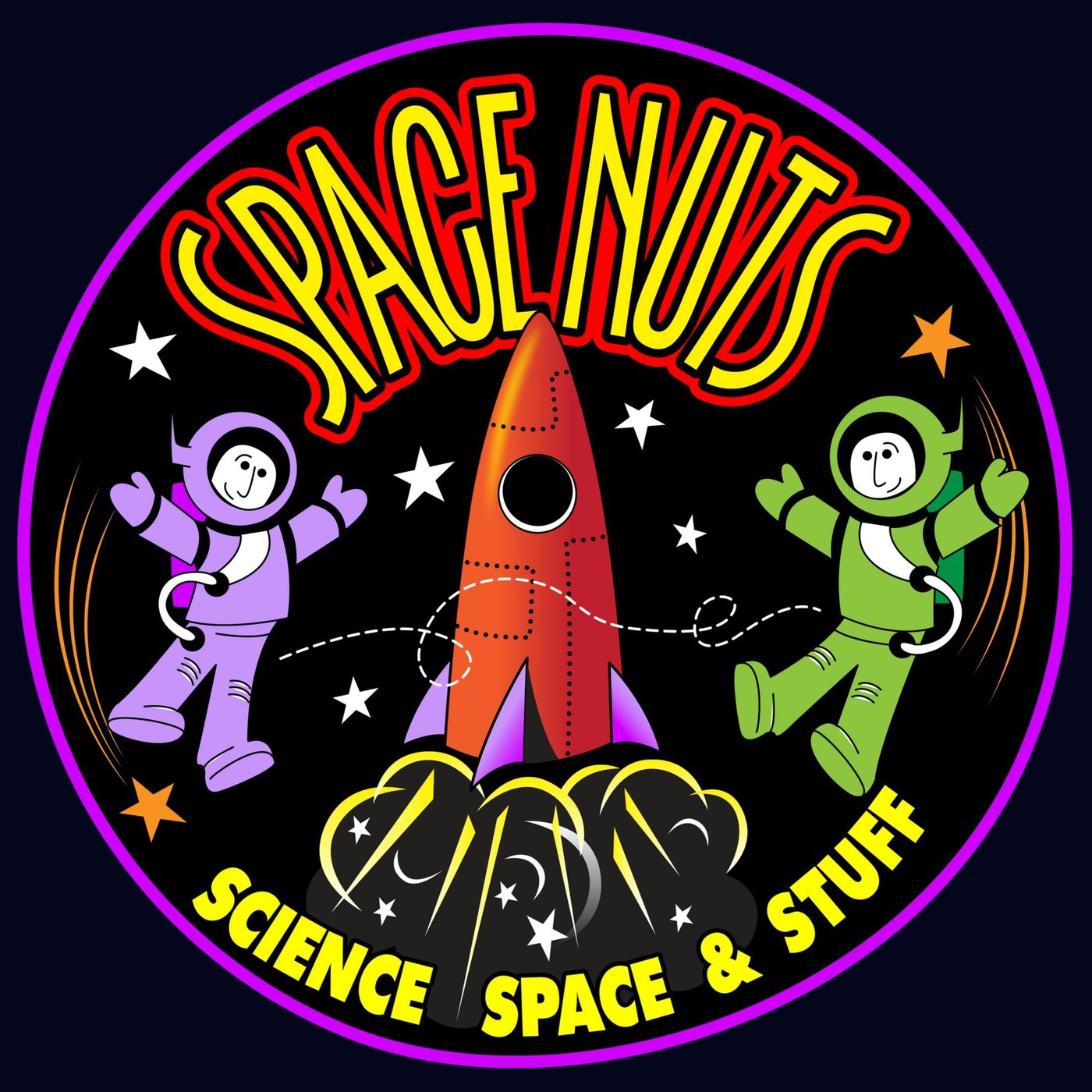

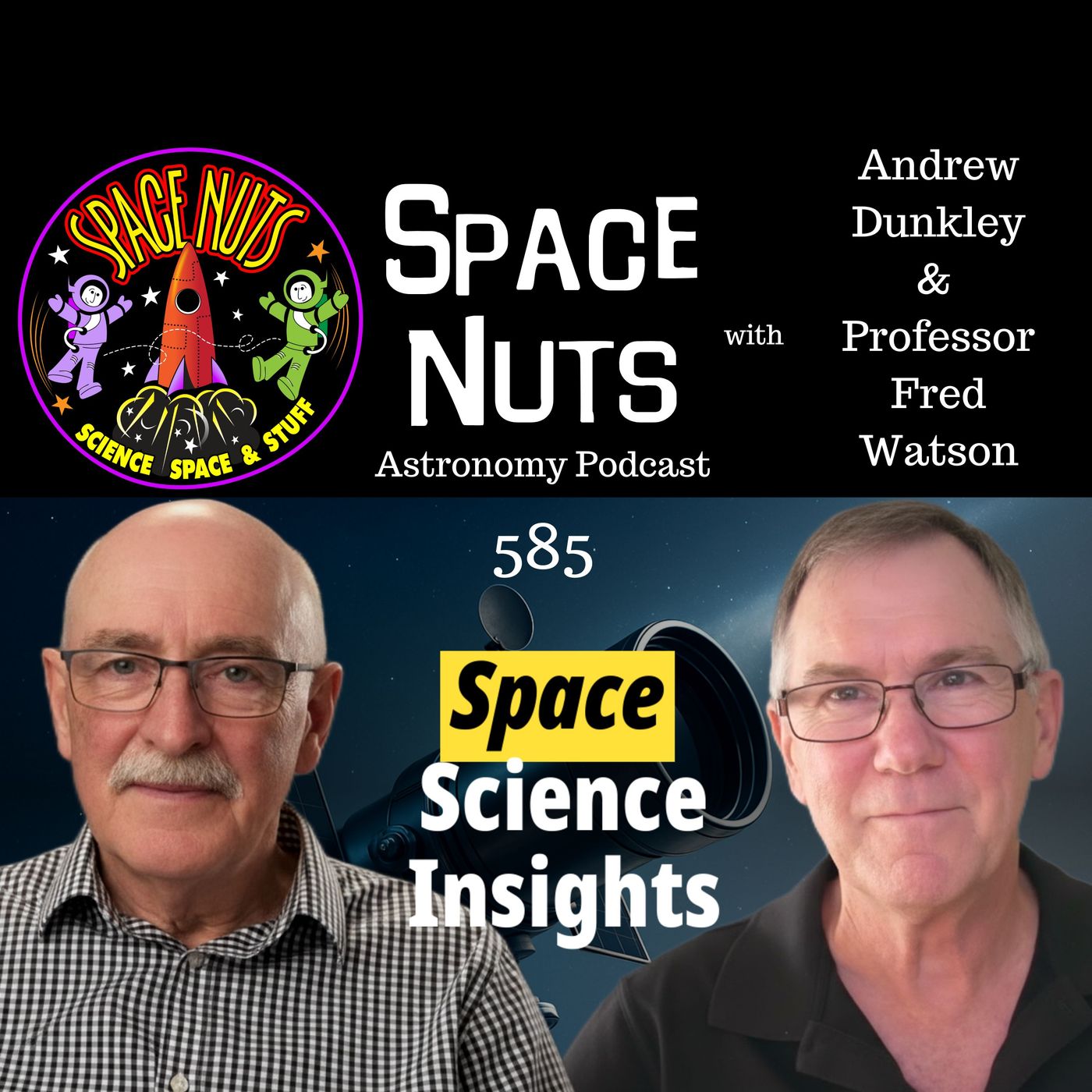
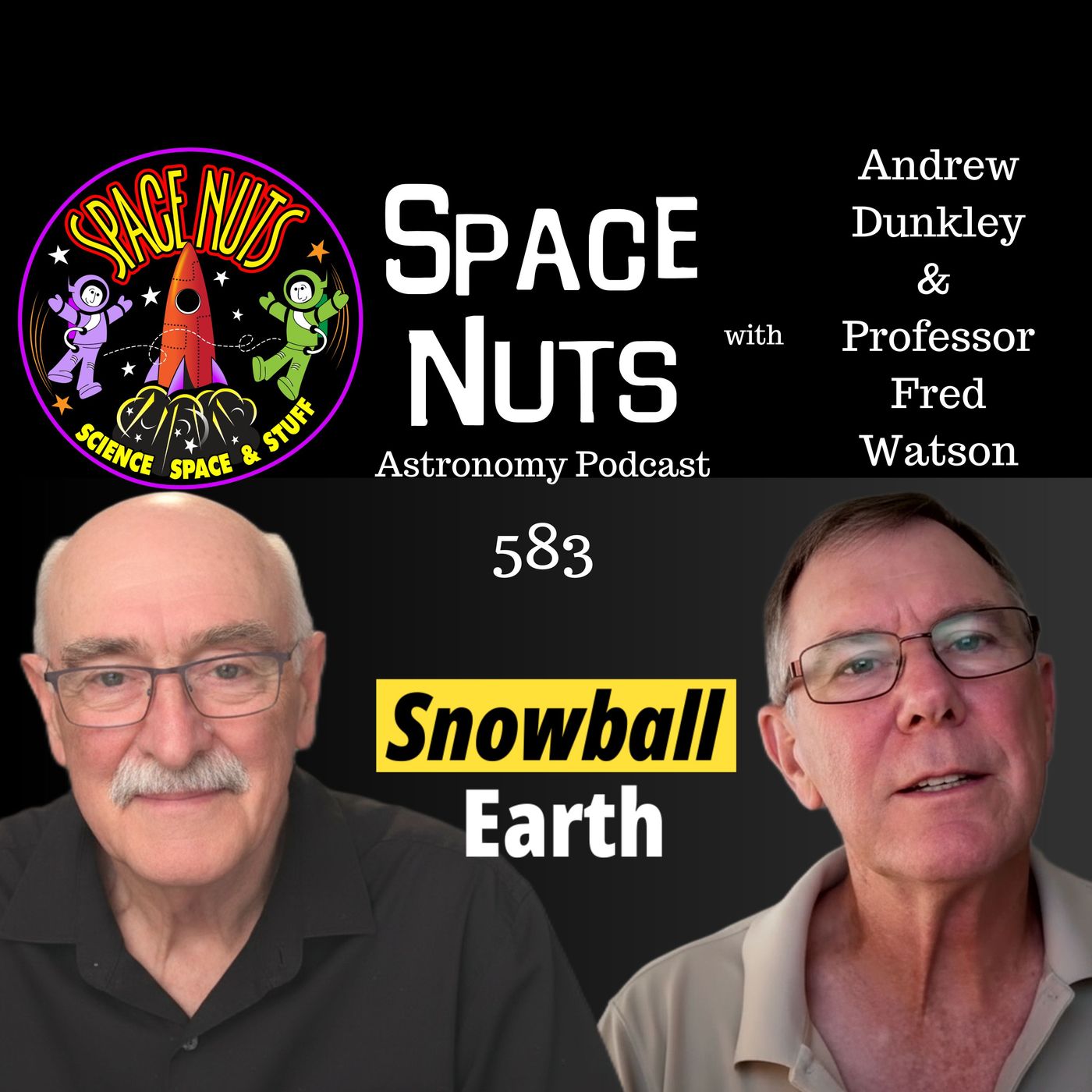
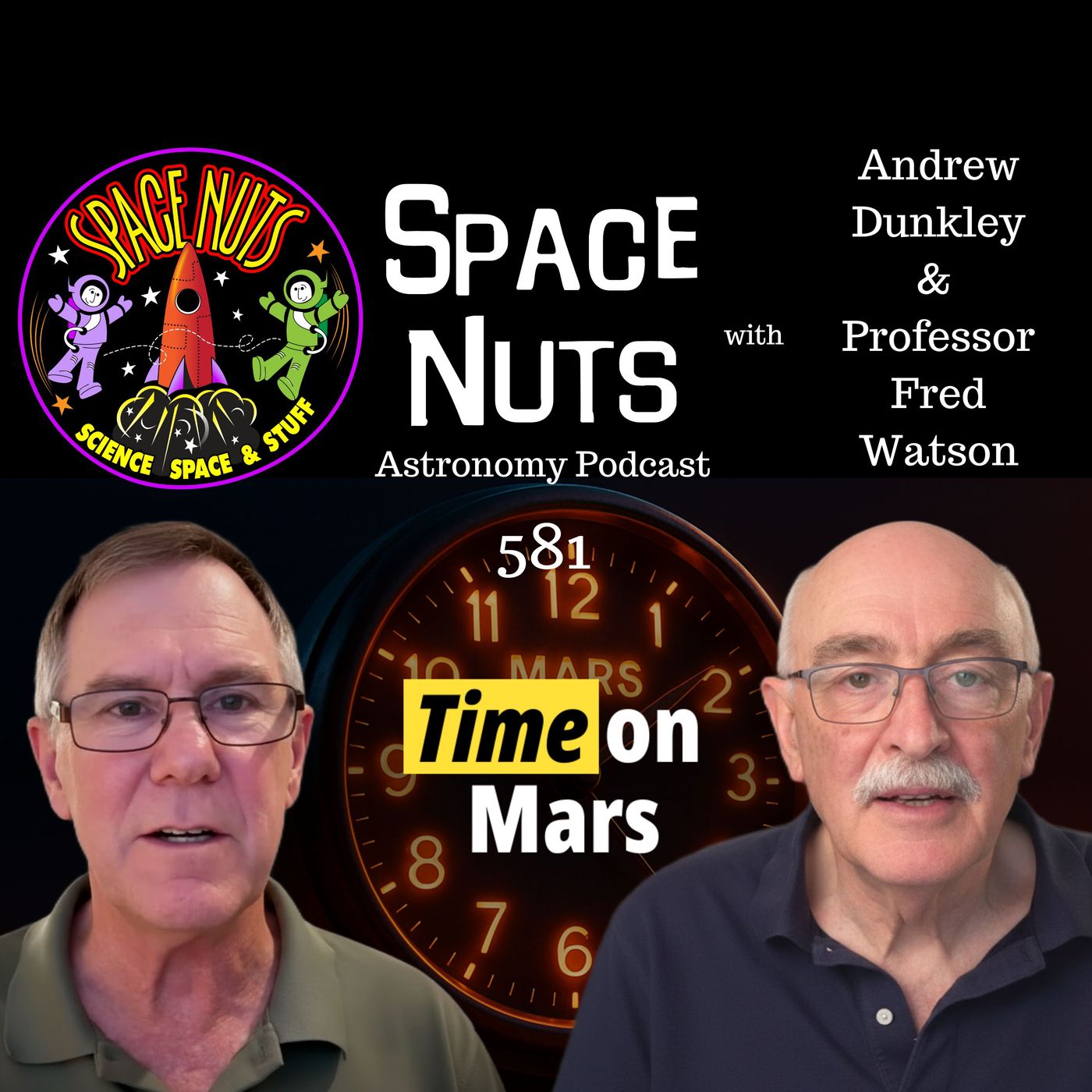
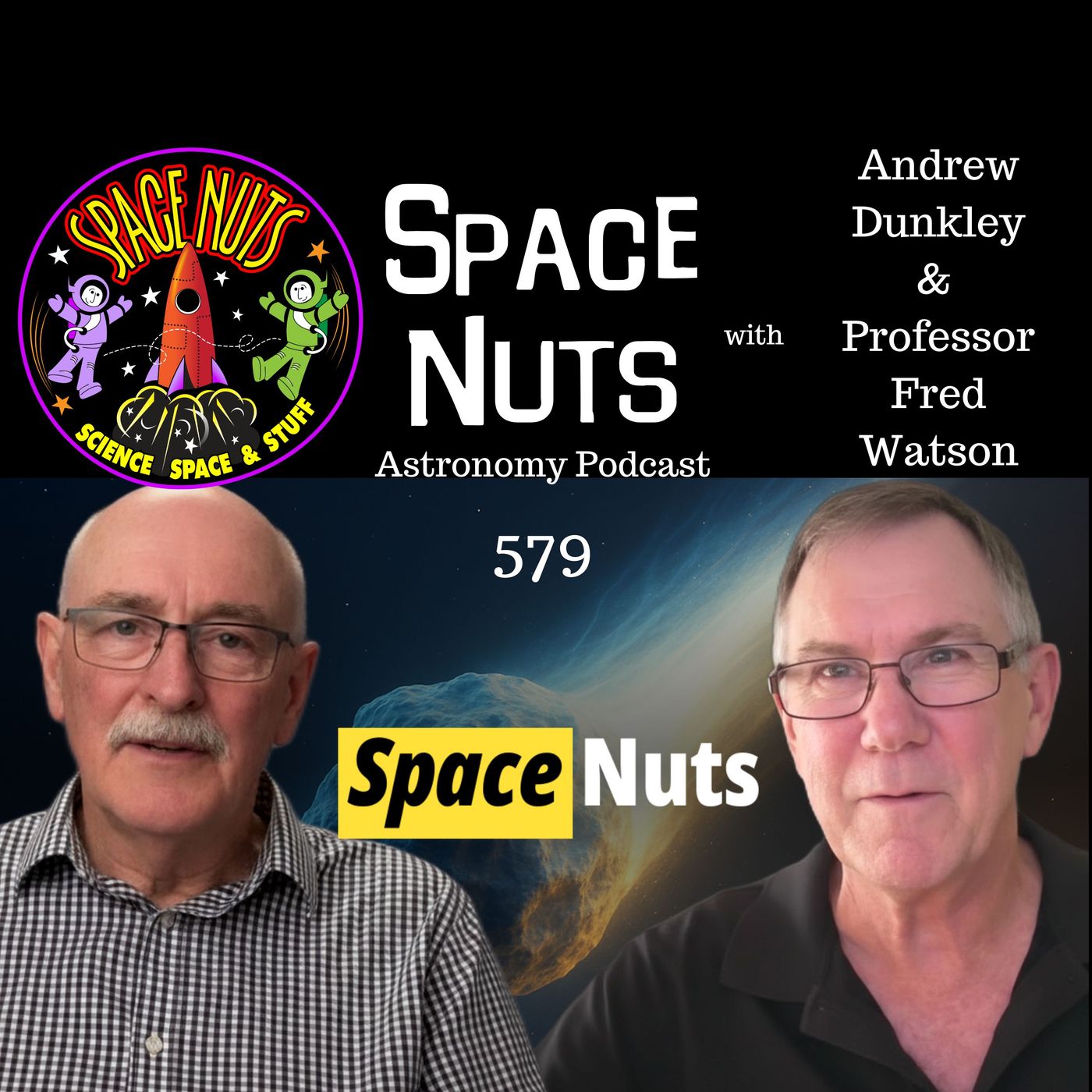
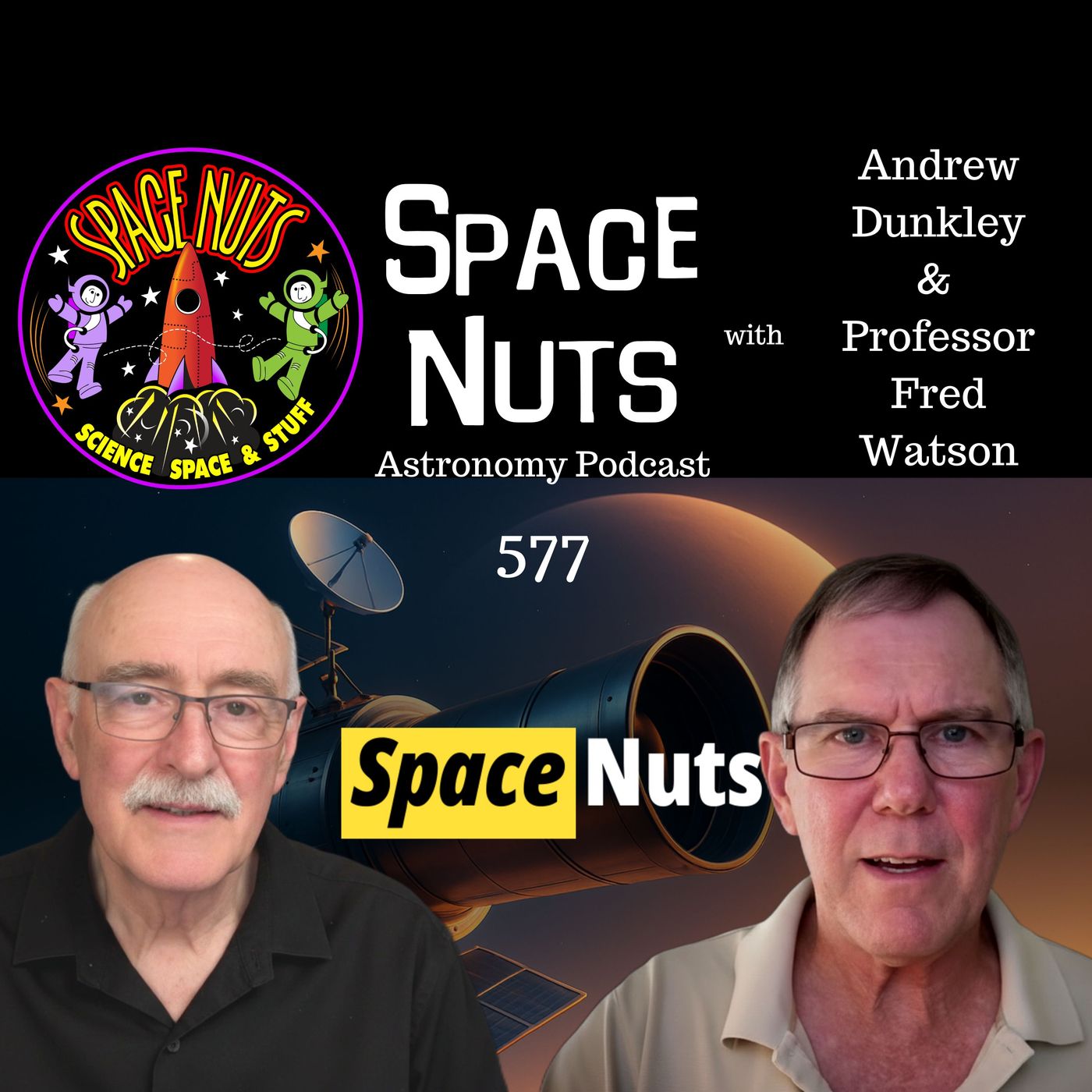
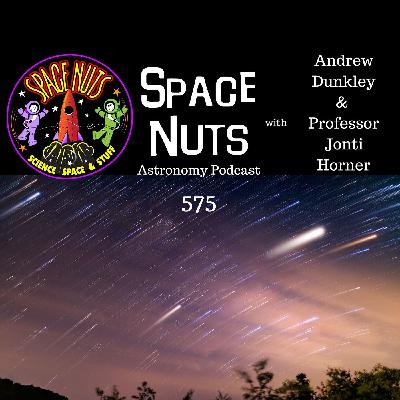
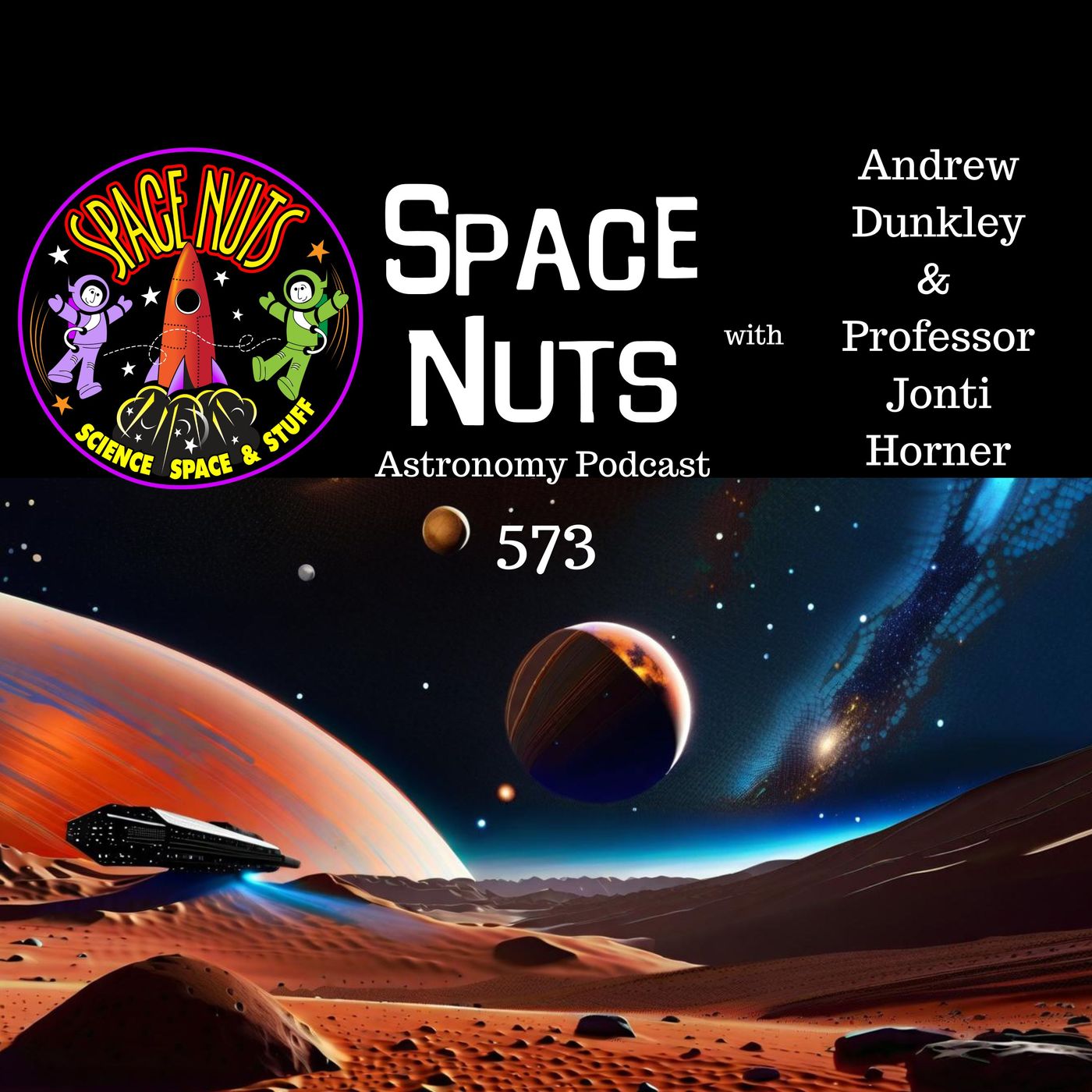
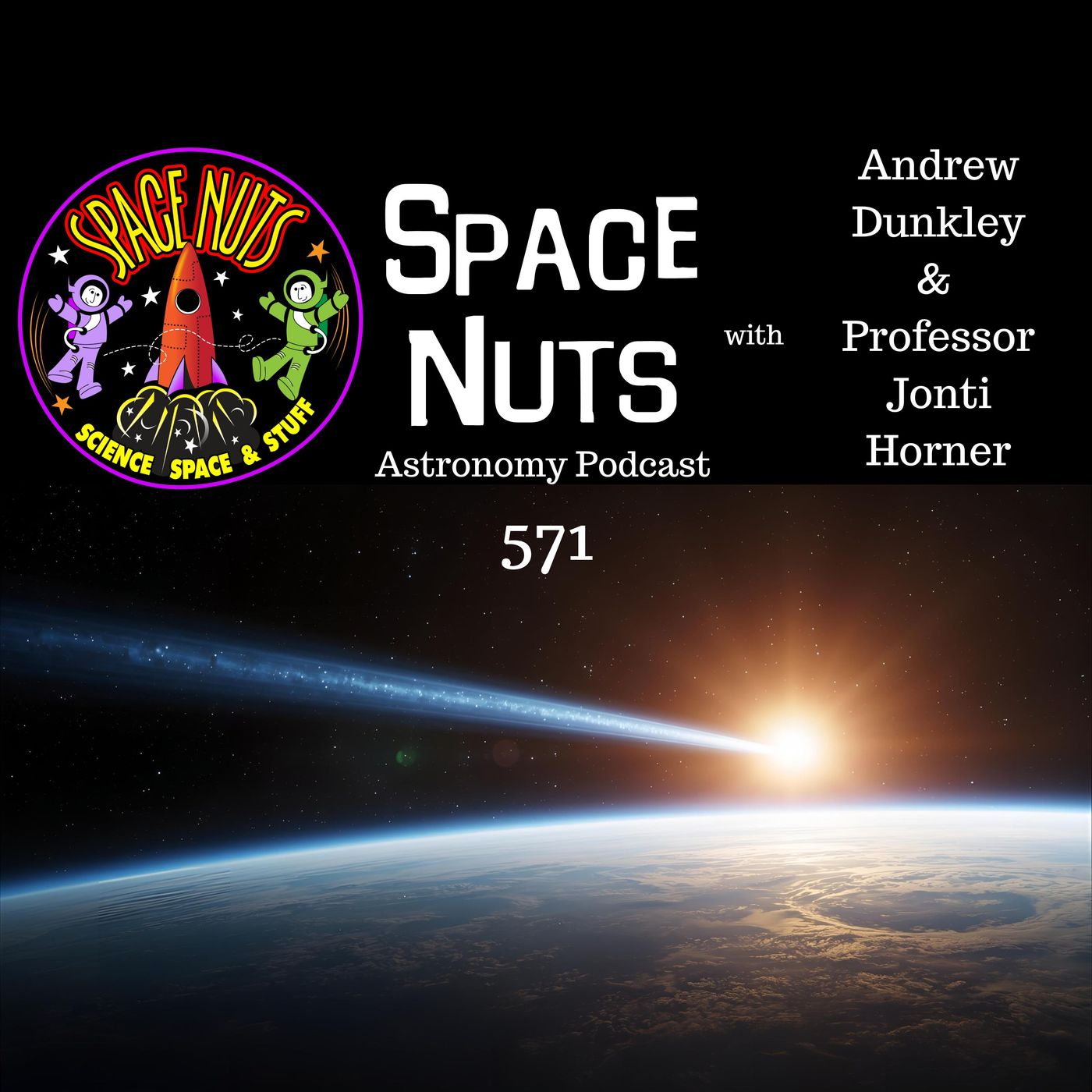
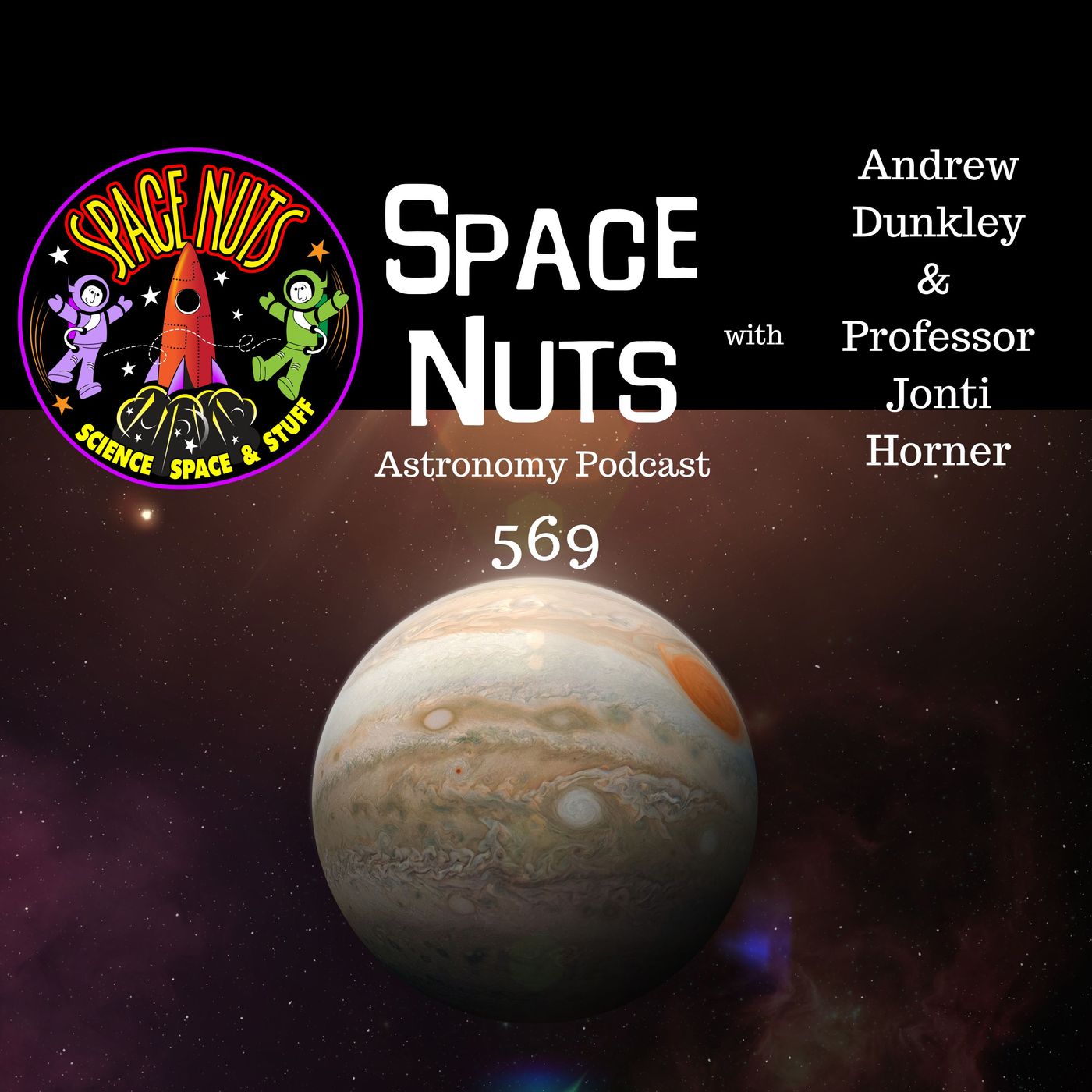



sadly bringing up politics in programs ruined it for me
too much ads
chandrayaan3 have already landed and its vikram rover is happily hopping around the moons surface for over a week! Are u publishing ur podcasts late?
Far and away my favorite podcast - I listen to every episode several times because they’re so dense with the crazy facts that outer space keeps throwing at us. Love it. I’d love to call in with questions I have but I don’t see how to do that. Can someone enlighten me? Keep up the great work guys.
My go-to weekly astronomy podcast, with two great presenters. Astronomical phenomena and news explained for the amateur astro-enthusiast.
This is a podcast show which i have been listening for a very very long time, almost since their first episode! If you are a space enthusiast, never miss Space Nuts! Fantastic podcast! Every episode is filled with a lot of information and will surely help increase your knowledge in the subject
from astronomer in charge to astronomer at large I found this show from fraisers universe today =))
Hi Andrew and Fred. Mike in Cincinnati.Question. What initiates the rotation of a star what is the base material that starts star formation?
Hey Andrew. This is Michael, Bengals fan. I'm starting the shows from the genesis.
get political again and I'm done with you!
Great information, excellent presentation and fun personalities ... got to listen and grow.
great Podcast to listen to and they get right to the point! Every podcast is really up to date with the newest discoveries. I am not your average space geek and totally geek out listening to space nuts! also do you think its possible humans are more likely to colonize the moon or get a detailed picture of the trappist 1 planets in the future?
love the podcast! even got an answer on one of my questions in a previous episode. keep up the amazing work guys!
i find this pod cast totally interesting. you could listen to the same episodes over again. only issue i have is this pod always freezes constantly